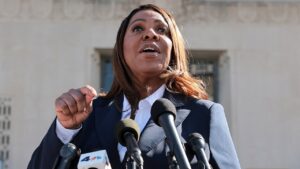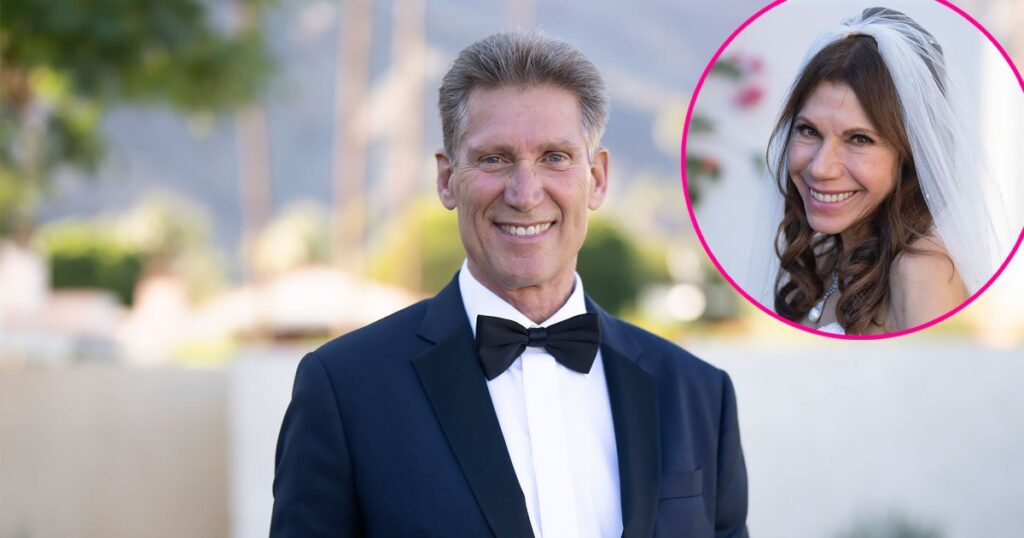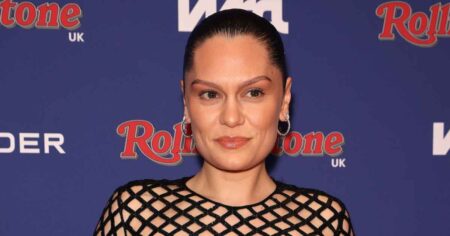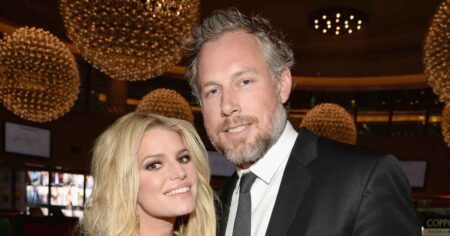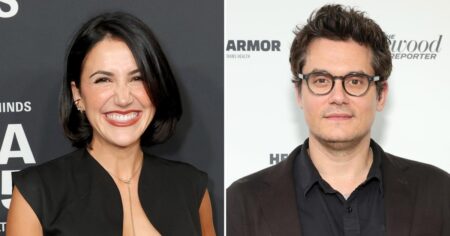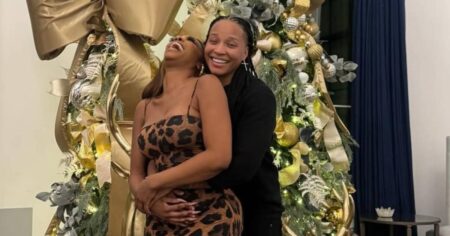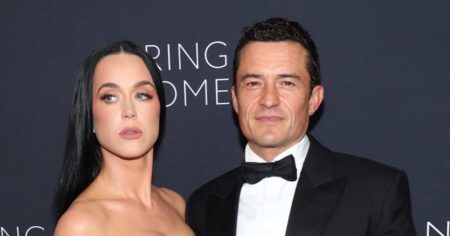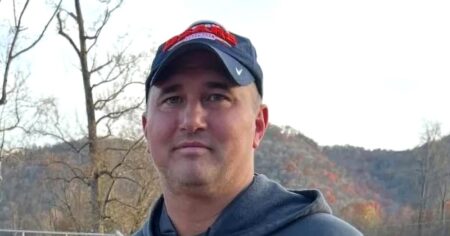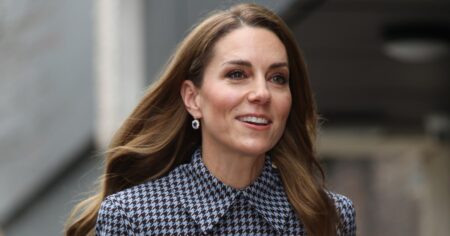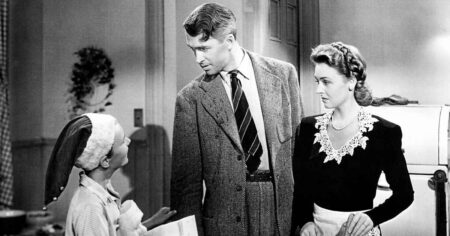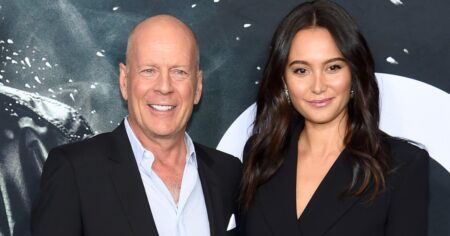When The Golden Bachelor premiered in 2023, Gerry Turner seemed like the wonderfully earnest antidote to the franchise’s usual chaos — a Midwestern widower with a tender heart and just the right amount of dad (even grandpa!) energy. As the inaugural lead of the show’s later-in-life spinoff, By the time he proposed to Theresa Nist in the emotional November finale, fans were fully invested in his second chance at love. Two months later, the pair made history with The Golden Wedding, a live televised ceremony that drew millions of viewers.
But the happily-ever-after didn’t last. Just three months later, Turner and Nist announced they had split — a twist that stunned fans and, Turner admits, left him struggling with how the story was told. “Quite honestly, there were some perceptions that I wanted to put on the right track,” Turner, 74, tells Us of his decision to write his new memoir, The Golden Years (out November 4). “The question was constantly, ‘Why are they getting divorced so quickly?’ And I was, I believe, made out to be a villain.”
The truth, he insists, is more nuanced. “Right before Theresa and I went on Good Morning America to announce that divorce, we agreed that we would protect each other, and I don’t feel like that happened,” he says. “I felt like I was taking the brunt of the situation. And I go, ‘No, wait a minute, that’s not right. It’s 50/50.’”
Now, Turner is ready for his next act — one that’s not being produced for network TV but still comes with a big diamond ring. Since receiving a bone marrow cancer diagnosis last year, he’s found love again with retired Indiana teacher Lana Sutton, and the pair announced their engagement on October 3. “For a long, long time, I said, ‘No, that’ll never happen,’” Turner says of getting married again. “Now that I have someone who makes me so happy, I can’t say no to that anymore.”
Here, Turner talks to Us about the lessons behind The Golden Years, the whirlwind of reality TV and what it means to write your own fairy tale when the cameras stop rolling.
There’s a lot in here, Gerry! Why was writing a book the right move for you?
I was filled with all these stories about what happened that never got to be seen, and feelings I had about some of the people on the show that I kept to myself. I decided, “Hey, it’s time to try and tell the whole story, and not just the portions that are good to the general public.” But as I got into the process, I realized I also wanted to fall back to the goals we had on the show — to keep yourself open to opportunities, enjoy life, don’t walk by anything that may be good for you just because you’ve gotten older.
Were you nervous about getting so candid?
Yes, I was. As evidence of that, there were four or five places in that book that I rewrote and then scratched and rewrote again. The question I asked myself is, “Am I being too harsh? Am I being too bland?” You want to find the right center.
You write a lot about your relationship with Theresa, beginning with the suggestion that she had a bit of a strategy while filming.
During the show, I did not have a feeling that that’s what was going on. In retrospect, when I’d start hearing comments or putting pieces together, I’d go, “Oh, now that comment makes more sense.” It’s one of those litmus tests for women on the show — are they there for the right reasons? I gave Theresa full credit that she was… and then, as time went by, I kind of had to change my mind on that.
You write that you felt that particularly when looking back at her words during her hometown date.
At the time with the hometowns, my thinking was that I had to commit 100 percent to what I was doing, and almost to the point [where], perhaps, I had blinders on and I was not looking as objectively as I should.
Like all Bachelor couples, you go from getting engaged to hiding your relationship from the public. What advice would you give yourself if you could go back to that time?
We didn’t have much time together between the show [ending] and the wedding. And I think that’s very unfortunate — certainly unintended by ABC, circumstances got in the way — but I should have been that guy that stomped his feet and yelled and said, “This has got to happen. We have to get to know each other.”
You write about feeling “empty” on the day of the proposal. Why did you get engaged on the show?
To put context to that, you have to go back to the time when it was done and put yourself in the position where, literally, the previous night, you had broken a heart. [Runner-up] Leslie [Fhima] and the issue that we got into the night before stuck with me really deeply. I cared for her very much, and I felt like I had mishandled the situation, not only the previous night, but ongoing. I’d made strong comments to her that perhaps was premature to make. So 12 or 14 hours later, I’m proposing to someone else and the joy wasn’t there. I felt like I was going through the motions of what I had expected and what I needed to do, but not that I was gleefully doing and not that I, really, wanted to be in that moment at that time. If it had been even a 24 hour or 48 hour window where I could have processed what had happened, I think it would have made me feel a lot different.
You also write that you told second runner-up Faith Martin you felt “trapped” ahead of The Golden Wedding. Why go through with it?
Commitment is a big thing, and I felt like I was doing the right thing. I just didn’t feel overjoyed about it. So much of the book is about how I felt at certain moments, and that’s only a momentary truth… I had second thoughts, but I don’t think [they] were exaggerated from anyone’s normal second thoughts. (When reached for comment, Nist told Us: “It makes me very sad to think that he felt empty and trapped. I wish he had said something and just ended it. But at least now I understand why he was so hurtful to me so many times. And I will say this. Those in glass houses should not throw stones. I do wish him all the best.”)
There are a lot of lifestyle differences you write about in the book. Do you feel like you should’ve figured those out before you got married?
On the show, I asked Theresa if she was ready to quit her job. She said, “When I meet the right guy, I’m ready to end my career.” What I heard was, “There is a woman who’s going to be willing to travel, to have some adventure to do, some things that I consider and that we should consider fun.” And then after the show, she always went back to, “Well, I really want to keep working.” And that just pretty much makes it an impossible situation.
Do you regret getting married?
In the big picture, I’m happy that it all happened the way it did, because it got me to where I am.
When you say you feel like Theresa made you out to be the villain after your split, what do you mean by that?
We were strongly advised not to make any independent statements [after GMA]. Literally 48 hours later, she was making a statement to social media. And I go, “No, that was not what we agreed to do. That was not our plan.”
Do you feel like you own up to your part in the divorce in the book?
Certainly. I was a bit naive; I was a bad listener. I didn’t probe well enough, and that’s both for my sake and for Theresa’s. Had I been better at some of those areas, maybe there would have been a different end.
Are you worried at all about her reading the book?
I’m not worried; I think she should be worried.
Do you wish Theresa the best?
We all have goals in life. We all deserve to be happy. So I certainly wish the same to her as I would all of the women and myself, and that she finds her path to her full happiness. There’s nothing wrong with embracing a career like she does — maybe that’s her source of happiness. And I think that would be wonderful. I just wish I would have known that if that’s the case.
Theresa isn’t the only woman you write about in The Golden Years. You are very complimentary of Leslie and apologetic for ending things over concerns about her past divorces and financial stability.
In the pressure cooker that is the show, you have certain feelings that, in retrospect, are somewhat artificial. I was questioning some of that with Leslie. And as the dust settled and time went by, I became a little more introspective on that and I realized that really it wasn’t a Leslie problem, it was a Gerry problem.
Are you surprised Leslie and Theresa are such good friends?
Not really. I’m happy for both of them that they are friends like that.
When Theresa and Kathy Swarts fought on The Golden Bachelor, you appeared to take Theresa’s side, which comes up in the book.
There is a spot in the book where I give a nod to Kathy that I wish I’d have been able to sit the two of them down and hear more, because the person that I thought was the villain at the time turned out, maybe, not to be the villain.
You also reflect on saying “I love you” to several women, including second runner-up Faith.
I carried that for a long time. I felt shallow about it. I felt like I’d let a commitment to myself fall by the wayside. I really only wanted to say those words to one other person the rest of my life, and I failed at that.
Did you reach out to any of your Bachelor exes for a second chance after your split from Theresa?
No. The full answer would be, I had some very pleasant conversations with Faith after the show. I consider her a quiet and true friend. I love it when I hear from her just randomly. And with regard to Leslie, Oh my God, I remember the day when I had tried to make contact with her, and she had the wall up. And I remember the day that she sent me the text that said, “Gerry, I forgive you. We’ll never have anything more than what we have now.” But I was so relieved to get that text from her that I was no longer a villain in her eyes.
You praise Joan Vassos, who left your season early, for how she was able to navigate being the Golden Bachelorette (which ended in her engagement to Chock Chapple).
There’s so much thrown at you at once, there’s so much outside noise that I think you have to be extremely disciplined to fight through all of that. [Joan] did a great job of fighting through that and staying true to what her goals were.
You were married to your first wife, Toni, for 43 years. You reveal in the book that after she died in 2017, you learned she’d been secretly diagnosed with diabetes. What was that like to process?
It was perplexing. When I found those testing devices and all the information about it, I thought, “Why was I not a good enough partner, close enough to her that she didn’t share that with me?” That still bothers me.
Was it therapeutic to write about her?
It was incredibly difficult. As I sat in front of my laptop, I could take the time to pause and shed a tear. I’ve learned to celebrate all the things that she was good at and all those great memories, and that has helped me so much. But still, there’s moments.
Tell Us about Lana. How did you two meet?
She tells this story much better than I do. After the show, I was approached on DMs and Instagram a lot. One day she sent me a message, and I noticed that we had a lot of common friends. I go, OK, I’ll answer that one. So we kind of went through social media step by step and I [finally] just said, “I have nothing to lose here. I’m gonna ask her out.”
What did she say in her DM?
She watched me on the show and the comment she made more than once is, “Oh my God, you were so hot. I really wanted to meet you.” I don’t know that her intentions were just platonic. We were just both open-minded. I’ve gone down that road a number of times and found women that were great people, but they just weren’t for me.
Why does your relationship work so well?
We’re both enjoying the travel, adventure and spontaneity. I feel how much she cares for me — some of the little gestures and so forth. I’ve never seen her without a smile on her face and a positive attitude. It’s just so uplifting. And I’ll occasionally drift off thinking about the health situation I have, and, man, she just smacks me and says, “Hey, we’re going to enjoy every day we have.” And I really could not be more blessed to have found a person who’s so compatible with me.
How have you been health-wise?
I feel really good. I have no symptoms. Doctors have me do blood tests every six months until I have a symptom. There’s no treatment yet. I’m very thankful. It is motivation for me to live like I’m dying. I’m not going to say no to something, because I may not ever get the chance to do it again.
Can you tell Us about what it’s like to hear the word “cancer,” but then feel fine?
It’s a gut punch. Every visit since has been a little more positive, because I talked to [the doctor] about these symptoms, and I said, “What happens when I do get those symptoms?” And he goes, “You may never get to that point, and if you do, there’s some drugs that will be very uncomfortable for you to take, but there are also drugs that may knock the progression of this cancer back 5, 6, 7 years.”
What’s the biggest takeaway you want readers to get from your story?
There’s going to be controversy around statements in the book. There’s going to be different perspectives on what I said and how I felt, but I think my biggest takeaway is you have to take what life gives you and do the best you can with it. And again, I’m so thankful for where I’m at right now that had any of those details changed along the way, I might not be where I am.
Read the full article here


